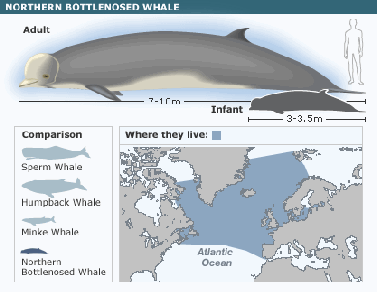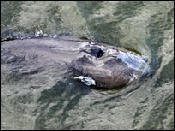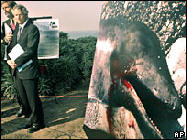EUROPEAN CETACEAN BYCATCH CAMPAIGN
"Man is but a strand in the complex web of life"
"Man is but a strand in the complex web of life"
London’s whale Conservation aid?
By Richard Black -
BBC News website
23rd January 2006
It was not the first whale to lose its way and its life in an unfamiliar watery byway, and it will not be the last.
But the unprecedented appearance of such a large and unfamiliar specimen as a northern bottlenose whale in the heart of a major city like London has led to media coverage beyond the wildest ambitions of conservation groups.
So large has coverage been, and so intense public interest, that some believe it could prove a positive force for whales, by helping to raise awareness of the various issues they face around the world.
"How many members of the public knew that we had an animal called the northern bottlenose whale living in waters just to the west of the UK?" was the rhetorical question from Mark Simmonds of the Whale and Dolphin Conservation Society (WDCS).
Click here to see distribution of northern bottlenose whale
"So despite the fact that it's a tragedy, it is a good thing from an educational point of view, and has raised questions about why this animal was found on the 'wrong' side of the UK coming up the Thames," he said.
Those questions surround the issue of displacement; whether some activity of humankind, perhaps connected with shipping, the military, or oil exploration, disrupted the life of this individual and sent it careering up the dead end of the Thames.
"You can't just pour all this [activity] into the oceans and believe that nothing is going to happen," Dr Simmonds told the BBC News website.
"If you took tanks into woodland, you wouldn't be surprised if squirrels and other wildlife started running out; and we shouldn't be surprised if something similar happens in the oceans."
Taking soundings
The sight of a disorientated cetacean on their doorstep may be a novelty for Londoners, but globally there is nothing unusual about the phenomenon.
Strandings are a common occurrence in Australasia, for example; and there is probably more than a single cause.
In recent years, military sonar has often been cited.
Four years ago a number of whales beached themselves during military exercises in the Canary Islands.
Post-
In a species which has evolved excellence over millennia in deep-
"When we look at the tissues down the microscope, we can actually see bubbles forming in the tissues," Paul Jepson from the Institute of Zoology in London told the BBC at the time.
"Although it's not absolutely conclusive, the only way we can explain these very unusual abnormalities [is that] this is a cetacean or marine mammal form of decompression sickness."
Other studies have implicated sonar in destruction of the mammals' delicate hearing systems.
Animal rights organisations have engaged in legal wrangles with the US Navy in particular over its use of sonar.
In the UK, conservation groups including the WDCS are pressing for a parliamentary inquiry.
"We've developed powerful new sonar in the UK, and policymakers need to understand the implications of it," said Mark Simmonds.
"We'd like to see a Select Committee sit down and review the available evidence -
Hunting's legacy
In years gone by, the major human threat to whales was, very clearly, hunting.
Stocks of the ocean's giant species such as the blue and sei whales were seriously depleted in decades of orgiastic frenzy.
Their smaller cousins such as the northern bottlenose (Hyperoodon ampullatus) did not escape.
"It was hunted commercially for many decades, particularly by Norway (60,000 killed from 1882 to the late 1920s, 5,800 from 1930 to 1973)," reads the northern bottlenose's entry in the Red List of threatened species published by IUCN, the World Conservation Union.
"The aggregate population was certainly reduced by whaling, and the extent of recovery is uncertain," it continues, before noting that in some localities "...large-
In most western societies there has been a sea-
There is not such awareness of the potential impacts of oil and gas exploration or military sonar, perhaps because the pictures are not so graphic, perhaps because the potential threat is not so immediate.
The hope of conservation groups which have fought and largely won the hunting battle is that through public pressure, politicians will be forced to confront and deal with these other issues.
From this perspective, the death of London's rare visitor will not have been in vain if it stimulates questions which would not otherwise have been asked.
Richard.Black-
BBC graphics of bottlenose Whale rescue

BBC PICTURES
Thames whale
Two-
Top

Northern bottlenose whale - lost near Albert Bridge in the Thames
Picture © Guy Bailey
Picture © Guy Bailey

Conservation groups protest in California about US military sonar
Picture © AP
Picture © AP

Picture © BBC
”The population was certainly reduced by whaling, and the extent of recovery is uncertain”
IUCN Red List